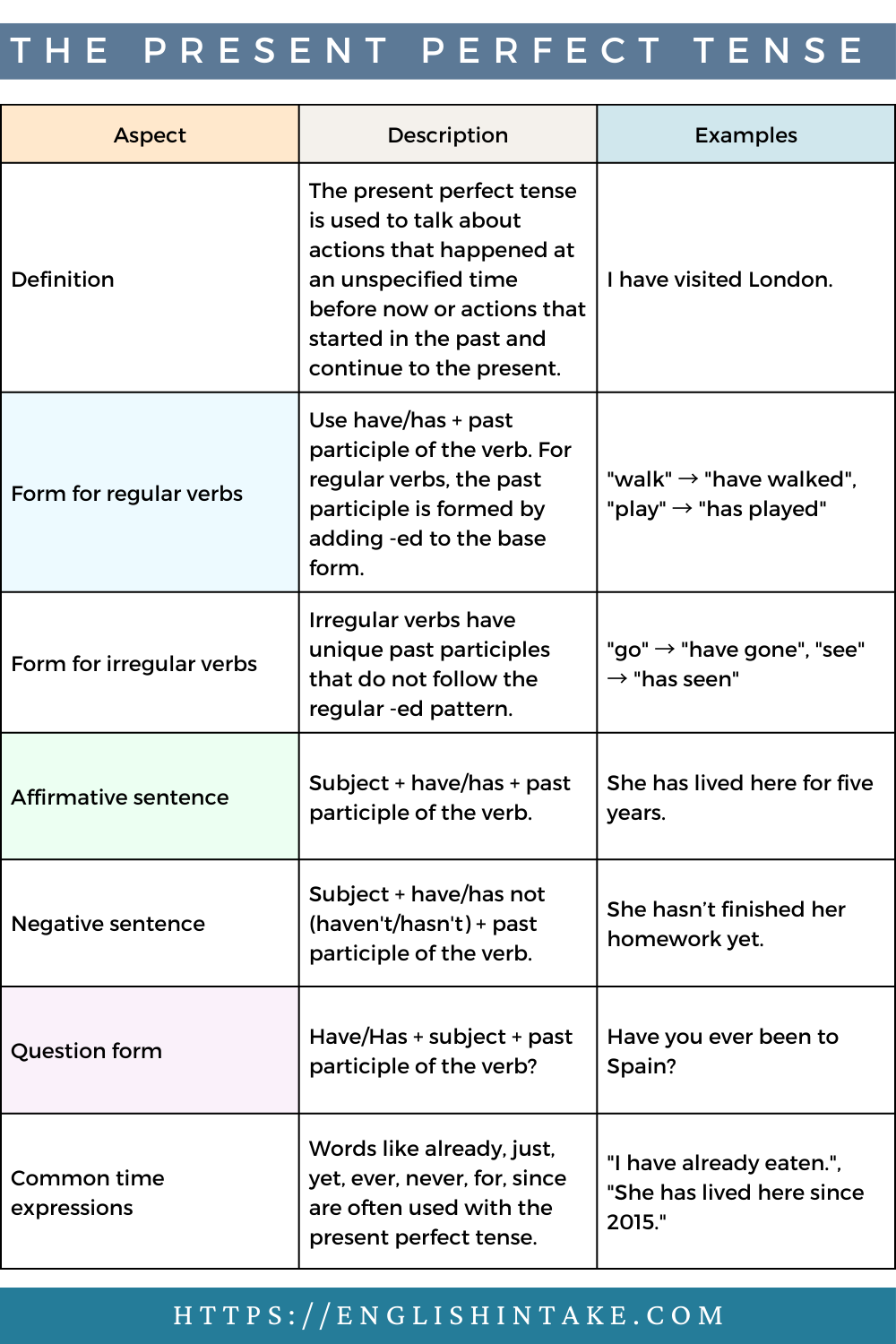1. What is the present perfect tense?
The present perfect tense is a grammatical verb form that describes actions or events that began in the past and have relevance or a connection to the present moment.
2. How to form the present perfect tense?
The present perfect is formed by using the auxiliary verb have (in the present tense) followed by the past participle of the main verb. For example:
- I have seen.
- She has finished.
- They have travelled.
| Form | Example | |
|---|---|---|
| Affirmative | ||
| Subject + have/has + Past participle | She has left. | |
| Negative | ||
| Subject + have/has not + Past participle | She hasn't left. | |
| Interrogative | ||
| Have/Has + Subject + Past participle? | Has she left? | |
| Negative Interrogative | ||
| Hasn't/Has not + Subject + Past participle? | Hasn't she left? | |
The use of have (or has for the third-person singular) indicates the present aspect, while the past participle of the verb expresses the completed action or state. The present perfect tense emphasises the result, impact, or relevance of the past event on the current situation. It usually pairs with time expressions such as already, just, recently, or since.
3. When should you use the present perfect tense?
3.1 Actions or events that started in the past and continue to the present
The present perfect tense is used to talk about actions or events that started in the past and connect to the present. It is formed with the present tense of the verb have and the past participle of the main verb.
1. I have lived here since 2012.
2. We have known Robert for about two years.
3. We have been married for ten years.
4. I haven’t seen him since yesterday.
5. We have worked together for ten years.
6. I have dreamed about becoming a police officer ever since I was a kid.
7. He hasn’t written a new book for the past ten years.
8. Tommy and Luise broke up last year. They haven’t spoken with each other since then.
9. We haven’t had a sunny day for two weeks.
3.2 Actions or events that happened at an unspecified time in the past
The present perfect tense can also be used to talk about actions that happened at an unspecified time in the past.
The government has implemented strict measures to help curb the spread of COVID-19.
Have you seen your brother?
I have seen this movie before.
I have lost my wallet.
The police have arrested the suspect.
3.3 Commonly used time adverbials
The following time adverbials usually link past actions or experiences to the present moment:
Have you ever played chess before?
I have never played chess before.
She has just arrived.
I have already had breakfast.
She hasn’t finished her homework yet.
She has lived here since 2015.
I have lived here for five years.
I haven’t been sleeping well lately.
Have you seen any good films recently?
Have you made any progress so far?
Up to now, we have collected 200 responses.
I haven’t realised this until now.
I’ve felt better ever since I started exercising.
To date, the team has won three trophies.
3.4 Describing past experience
To talk about past experiences or achievements without mentioning exactly when they happened, we commonly use the following adverbs of experience or frequency:
Have you ever been to London?
I’ve never tasted sushi.
Have you finished your homework yet?
They’ve already arrived at the hotel.
I’ve only seen her once.
He’s visited Spain twice.
We’ve eaten there several times.
She’s phoned me many times today.
Have you met each other before?
I’ve recently changed jobs.
I haven’t been sleeping well lately.
4. Present perfect chart
The chart below explains the usage and structure of the present perfect tense in English. It gives various examples of past experiences or events that have occurred at an unspecified time but still connect to the present. The chart also includes the affirmative, negative, and question forms of the tense.

5. Common mistakes
5.1 Using specific past time indicators
The present perfect cannot be used with specific time expressions that refer to the past, such as "yesterday," "last week," or "in 2010." Use the past simple tense instead.
- ✗ Incorrect: I have seen him yesterday.
- ✓ I saw him yesterday.
- ✗ Incorrect: I have visited Paris last year.
- ✓ I visited Paris last year.
| Use past simple | Use present perfect | Use of both tenses are possible |
|---|---|---|
yesterday
| since yesterday
| today
|
last night
| since last night
| this morning
|
last week
| since last week
| this week
|
last weekend
| since last weekend
| this weekend
|
last month
| since last month
| this month
|
last year
| since last year
| this year
|
two days ago
| for two days
| ✗ |
in 2020
| since 2020
| ✗ |
between 2001 and 2002
| since 2001
| ✗ |
when I was young
| since I was young
| ✗ |
5.2 Omitting the auxiliary verb have
The present perfect requires the auxiliary verb have or has before the past participle.
- ✗ Incorrect: I never seen that movie.
- ✓ Correct: I have never seen that movie.
Are you ready for a test? Head over to our present perfect worksheet.
